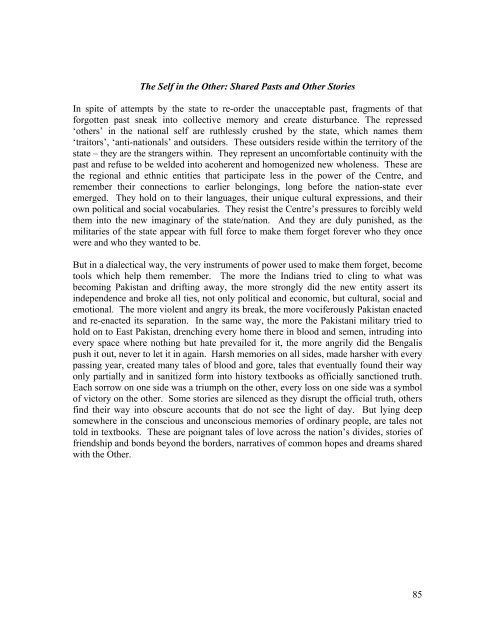Living on the Margins. Minorities in South Asia - EURAC
Living on the Margins. Minorities in South Asia - EURAC
Living on the Margins. Minorities in South Asia - EURAC
- TAGS
- minorities
- eurac
- www.eurac.edu
You also want an ePaper? Increase the reach of your titles
YUMPU automatically turns print PDFs into web optimized ePapers that Google loves.
The Self <strong>in</strong> <strong>the</strong> O<strong>the</strong>r: Shared Pasts and O<strong>the</strong>r Stories<br />
In spite of attempts by <strong>the</strong> state to re-order <strong>the</strong> unacceptable past, fragments of that<br />
forgotten past sneak <strong>in</strong>to collective memory and create disturbance. The repressed<br />
‘o<strong>the</strong>rs’ <strong>in</strong> <strong>the</strong> nati<strong>on</strong>al self are ruthlessly crushed by <strong>the</strong> state, which names <strong>the</strong>m<br />
‘traitors’, ‘anti-nati<strong>on</strong>als’ and outsiders. These outsiders reside with<strong>in</strong> <strong>the</strong> territory of <strong>the</strong><br />
state – <strong>the</strong>y are <strong>the</strong> strangers with<strong>in</strong>. They represent an uncomfortable c<strong>on</strong>t<strong>in</strong>uity with <strong>the</strong><br />
past and refuse to be welded <strong>in</strong>to acoherent and homogenized new wholeness. These are<br />
<strong>the</strong> regi<strong>on</strong>al and ethnic entities that participate less <strong>in</strong> <strong>the</strong> power of <strong>the</strong> Centre, and<br />
remember <strong>the</strong>ir c<strong>on</strong>necti<strong>on</strong>s to earlier bel<strong>on</strong>g<strong>in</strong>gs, l<strong>on</strong>g before <strong>the</strong> nati<strong>on</strong>-state ever<br />
emerged. They hold <strong>on</strong> to <strong>the</strong>ir languages, <strong>the</strong>ir unique cultural expressi<strong>on</strong>s, and <strong>the</strong>ir<br />
own political and social vocabularies. They resist <strong>the</strong> Centre’s pressures to forcibly weld<br />
<strong>the</strong>m <strong>in</strong>to <strong>the</strong> new imag<strong>in</strong>ary of <strong>the</strong> state/nati<strong>on</strong>. And <strong>the</strong>y are duly punished, as <strong>the</strong><br />
militaries of <strong>the</strong> state appear with full force to make <strong>the</strong>m forget forever who <strong>the</strong>y <strong>on</strong>ce<br />
were and who <strong>the</strong>y wanted to be.<br />
But <strong>in</strong> a dialectical way, <strong>the</strong> very <strong>in</strong>struments of power used to make <strong>the</strong>m forget, become<br />
tools which help <strong>the</strong>m remember. The more <strong>the</strong> Indians tried to cl<strong>in</strong>g to what was<br />
becom<strong>in</strong>g Pakistan and drift<strong>in</strong>g away, <strong>the</strong> more str<strong>on</strong>gly did <strong>the</strong> new entity assert its<br />
<strong>in</strong>dependence and broke all ties, not <strong>on</strong>ly political and ec<strong>on</strong>omic, but cultural, social and<br />
emoti<strong>on</strong>al. The more violent and angry its break, <strong>the</strong> more vociferously Pakistan enacted<br />
and re-enacted its separati<strong>on</strong>. In <strong>the</strong> same way, <strong>the</strong> more <strong>the</strong> Pakistani military tried to<br />
hold <strong>on</strong> to East Pakistan, drench<strong>in</strong>g every home <strong>the</strong>re <strong>in</strong> blood and semen, <strong>in</strong>trud<strong>in</strong>g <strong>in</strong>to<br />
every space where noth<strong>in</strong>g but hate prevailed for it, <strong>the</strong> more angrily did <strong>the</strong> Bengalis<br />
push it out, never to let it <strong>in</strong> aga<strong>in</strong>. Harsh memories <strong>on</strong> all sides, made harsher with every<br />
pass<strong>in</strong>g year, created many tales of blood and gore, tales that eventually found <strong>the</strong>ir way<br />
<strong>on</strong>ly partially and <strong>in</strong> sanitized form <strong>in</strong>to history textbooks as officially sancti<strong>on</strong>ed truth.<br />
Each sorrow <strong>on</strong> <strong>on</strong>e side was a triumph <strong>on</strong> <strong>the</strong> o<strong>the</strong>r, every loss <strong>on</strong> <strong>on</strong>e side was a symbol<br />
of victory <strong>on</strong> <strong>the</strong> o<strong>the</strong>r. Some stories are silenced as <strong>the</strong>y disrupt <strong>the</strong> official truth, o<strong>the</strong>rs<br />
f<strong>in</strong>d <strong>the</strong>ir way <strong>in</strong>to obscure accounts that do not see <strong>the</strong> light of day. But ly<strong>in</strong>g deep<br />
somewhere <strong>in</strong> <strong>the</strong> c<strong>on</strong>scious and unc<strong>on</strong>scious memories of ord<strong>in</strong>ary people, are tales not<br />
told <strong>in</strong> textbooks. These are poignant tales of love across <strong>the</strong> nati<strong>on</strong>’s divides, stories of<br />
friendship and b<strong>on</strong>ds bey<strong>on</strong>d <strong>the</strong> borders, narratives of comm<strong>on</strong> hopes and dreams shared<br />
with <strong>the</strong> O<strong>the</strong>r.<br />
85

















